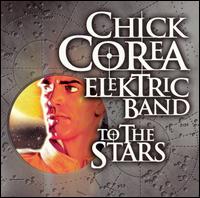
Armando Anthony "Chick" Corea was an American jazz pianist, composer, bandleader and occasional percussionist. His compositions "Spain", "500 Miles High", "La Fiesta", "Armando's Rhumba" and "Windows" are widely considered jazz standards. As a member of Miles Davis's band in the late 1960s, he participated in the birth of jazz fusion. In the 1970s he formed Return to Forever. Along with McCoy Tyner, Herbie Hancock and Keith Jarrett, Corea is considered to have been one of the foremost pianists of the post-John Coltrane era.

"Spain" is an instrumental jazz fusion composition by jazz pianist and composer Chick Corea. It is likely Corea's most recognized piece, and is considered a jazz standard.

Return to Forever was an American jazz fusion band that was founded by pianist Chick Corea in 1972. The band has had many members, with the only consistent bandmate of Corea's being bassist Stanley Clarke. Along with Weather Report, The Headhunters, and Mahavishnu Orchestra, Return to Forever is often cited as one of the core groups of the jazz-fusion movement of the 1970s. Several musicians, including Clarke, Flora Purim, Airto Moreira and Al Di Meola, came to prominence through their performances on Return to Forever albums.
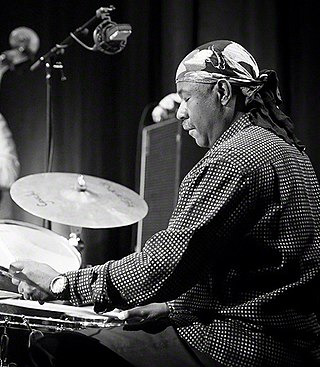
Leonard White III is an American jazz fusion drummer who was a member of the band Return to Forever led by Chick Corea in the 1970s. White has been called "one of the founding fathers of jazz fusion".
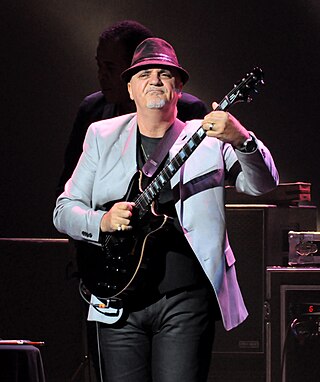
Frank Gambale is an Australian jazz fusion guitarist. He has released twenty albums over a period of three decades, and is known for his use of the sweep picking and economy picking techniques.

Romantic Warrior is a studio album by the American jazz fusion band Return to Forever, their first recorded for Columbia Records, after releasing their previous four albums on Polydor. In February 1976, the group retreated to Caribou Ranch near Nederland, Colorado to record. It was the first album to remove the "featuring Chick Corea" credit from beside the band name on the album cover.

Eye of the Beholder is a 1988 album by the Chick Corea Elektric Band. It features Chick Corea with guitarist Frank Gambale, saxophonist Eric Marienthal, drummer Dave Weckl and bassist John Patitucci.

Chick Corea Elektric Band was a jazz fusion band, led by keyboardist and pianist Chick Corea and founded in 1986 in New York City. The band was nominated twice at the Grammy Awards. The sixth band album, a tribute one named Chick Corea Elektric Band II - Paint the World and released in 1993, received an additional nomination the next year. The group reunited in 2003, and Corea died in 2021.

Light Years is an album by the Chick Corea Elektric Band. It features Chick Corea with guitarist Frank Gambale, saxophonist Eric Marienthal, bassist John Patitucci, and drummer Dave Weckl. The album received the 1988 Grammy Award for the Best R&B Instrumental Performance.

The Road to Freedom is a 1986 record album by "L. Ron Hubbard & Friends". Artists that worked on the album include John Travolta, Chick Corea, Leif Garrett, Frank Stallone, and Karen Black.
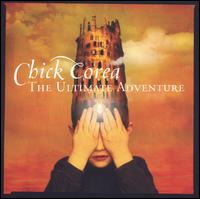
The Ultimate Adventure is an album recorded by Chick Corea and released in 2006.

Space Jazz: The soundtrack of the book Battlefield Earth is a music album and soundtrack companion to the novel Battlefield Earth by L. Ron Hubbard, released in 1982. Hubbard composed the music for the album.

To the Stars is a science fiction novel by American writer L. Ron Hubbard. The novel's story is set in a dystopian future, and chronicles the experiences of protagonist Alan Corday aboard a starship called the Hound of Heaven as he copes with the travails of time dilation from traveling at near light speed. Corday is kidnapped by the ship's captain and forced to become a member of their crew, and when he next returns to Earth his fiancée has aged and barely remembers him. He becomes accustomed to life aboard the ship, and when the captain dies Corday assumes command.
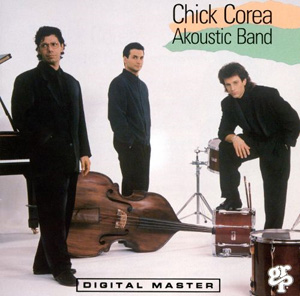
Akoustic Band is the first album by the Chick Corea Akoustic Band, featuring Chick Corea with John Patitucci and Dave Weckl. The group was nominated and received the 1990 Grammy Award for Best Jazz Instrumental Performance, Group at the 32nd Annual Grammy Awards.

LifeTimes is an album by Diana Hubbard, released in 1979 by Waterhouse Records 8. In addition to Diana Hubbard, the album includes musical contributions from Chick Corea, Stanley Clarke, John Goodsall, Michael Boddicker, and Patrick Moraz.

James Christopher Earl is an American jazz bass guitarist who is a member of the Jimmy Kimmel Live! band.

The Chick Corea Elektric Band is an album by jazz and fusion keyboard player Chick Corea, released in 1986. It is the eponymous debut album of the Chick Corea Elektric Band, which at that time also featured drummer Dave Weckl, bass player John Patitucci and guitarists Scott Henderson and Carlos Rios.

Inside Out is an album by the Chick Corea Elektric Band, released in 1990 through the record label GRP. The album peaked at number six on Billboard's Top Contemporary Jazz Albums chart.

Beneath the Mask is an album by Chick Corea Elektric Band, released in 1991 through the record label GRP. The album peaked at number two on Billboard's Top Contemporary Jazz Albums chart.

The Mothership Returns is a live two CD/single DVD set by the fusion band Return to Forever. Released 18 June 2012 by Eagle Rock Entertainment, it documents music performed during the 2011 tour, for which Return to Forever was expanded to a quintet with Chick Corea, Stanley Clarke, Lenny White and new members Jean-Luc Ponty on violin and Frank Gambale on guitar. The album peaked #6 in the 2012 and 2013 Jazz Album charts.
